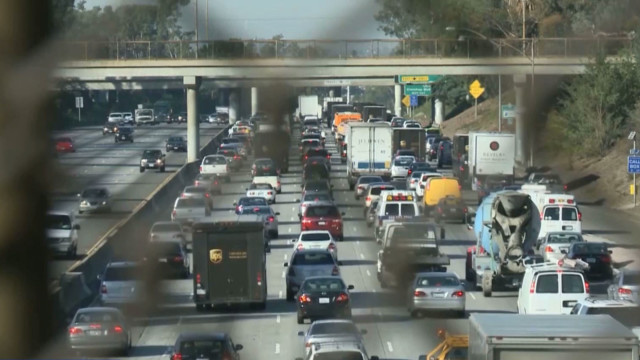The U.S. State of California and the Trump administration haven’t always seen eye-to-eye over such issues as immigration and climate change. And in yet another battle, California is now leading 17 states in suing the U.S Environmental Protection Agency for revising vehicle emission standards.
CGTN’s Mark Niu reports.
In April, Environmental Protection Agency Administrator Scott Pruitt attacked Obama-era vehicle emission standards that seek to increase fuel economy to an average of around 50 miles per gallon, or 5.6 liters per 100 kilometers, by 2025.
“I am determining that those standards are inappropriate and should be revised,” Pruitt said on April 4.
His announcement sets the stage for the re-writing of emission standards for vehicles made between 2022-2025.
It’s a message that was warmly received by auto industry groups attending the speech.
“Manufacturers need to sell vehicles that customers need and want today to fund the technological shifts in electrification and automation expected in the future,” the President of Global Automakers John Bozzella, who was also speaking at the event said.
One key target is the states of California, which is home to the most cars and traffic in the nation.
Because of a waiver in a federal law to help the state battle extreme air pollution, Washington permitted California to set stricter greenhouse gas emission standards.
At least twelve other states are following California’s standard too. But Pruitt said California is not the sole arbiter of such issues.
“We’re not looking for a fight. They’re the one’s looking for a fight, “ said Stanley Young, the Communications Director for the California Air Resources Board. “Right now, we are here and each year the fuel efficiency starts rising. What they might do is they might drop down and we are left here. And there is a gap between what we California and the other twelve states and the federal government want.”
Young shows me a Detroit newspaper article about how lower emission standards hurt the respiratory health of a couple in California.
He also said California and the U.S. federal government already spent two years studying the issue.
“Pruitt has not given us any data, any analysis, any provisional numbers that we can even begin to discuss to begin to determine how they could effect us,” said Young. “So all he did was say with no proof that the standards are too tough.”
Now, California leads more than a dozen states in a lawsuit against the EPA’s rolling back of the Obama administration fuel-economy standards.
And the state also braces for a potential legal challenge by the EPA as to whether it has the right to set its own greenhouse gas emission standards.
“This has happened over the years where the EPA and California have not been on the same page, whenever it’s ended up in court, California has always won,” said Michael Coates, Editor of the Clean Fleet Report. “Short of re-interpreting the constitution, I don’t think there’s any way the EPA could win.”
Environmental automotive writer Michael Coates said a key reason much of the auto industry supports lower mileage standards is sales of bigger cars.
“Industry makes a lot more money on SUV’s and pickup trucks. Those type of vehicles, there’s a natural desire to sell more of those than electric cars, which they are actually losing money off of,” said Coates.
California currently has a mandate in place that requires car manufacturers to sell a certain percentage of zero-emission vehicles. But the air resources board said so far there have been no signs of the EPA calling that policy into question.
 CGTN America
CGTN America

